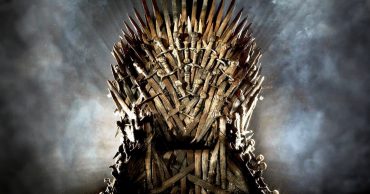
“The Gift” is by far the busiest episode of Game of Thrones this season, a narrative fractured across many different landscapes, characters, and stories. In places, the truncated plot each location is a blessing; in others, it points out some of Season 5’s biggest flaws, its inability to make new characters and stories feel like they actually matter in the large scheme of things. They’re all connected, like many episodes this season, by the idea of faith and, as I mentioned earlier this season, how dangerous a double-edged sword faith can be.
For Cersei and Sansa both, faith comes in the form of reckless attempts to try and reclaim some semblance of power over the changing world around him. The only thing separating the two in this episode is the fact Sansa is horribly married to Ramsay (who won’t let her outside, holding her as his sex slave); by the end, Cersei’s locked up in a prison herself, victim to a situation she assumed would be much simpler and direct than it was. Their situations, while very different, certainly evoke the same emotion: both women are reeling from the loss of agency in their own lives, suffering for placing their faith in the most appealing of places. At the end of the day, Littlefinger still has his own agenda (or else he wouldn’t have left Sansa there, knowing what kind of creature Ramsay was), and so does the High Sparrow, who has isolated poor King Tommen from his only sources of guidance and power; these cruel men understand the power emotional trauma has over the people, using it to bring the “nobles” (aka the Starks and Lannisters) down to their less-heralded – and in the case of the Sparrow, unshowered – level, where the only trust to be had lies in those flying the same banner (or in the case of Lancel, wearing the same brand on their forehead).
Cersei’s plan backfiring is a wildly satisfying moment for the series, one that helps combat the hopelessness we feel in Winterfell after Sansa’s elderly friend ends up flayed at the hands of Ramsay (after Reek wimps out and betrays Sansa’s plan, of course). It’s an important reminder that justice, in some form, finds its way to the doorstep of every character. Whether breaking a vow like the honorable Robb Stark, or putting their faith in a crazy fundamentalist (something that Stannis is also learning a lot about; we’ll get back to him), every decision in Westeros comes with a consequence: some just take a lot longer than others to arrive. Cersei’s comeuppance is a major release of tension in Winterfell, even as new stresses immediately replace it; removing Cersei from power is something that’s needed to be done for a long time, and regardless of how inconveniently it comes about, represents a major turning point for her character, and the dynamic in King’s Landing in general.
That idea of faith – Season 5’s thematic foundation, if you will – continues to rear its head throughout “The Gift,” to mixed effect. Outside of King’s Landing, the most powerful employment of the idea comes with Stannis, a man whose faith is directly tied to his performance on the battlefield, a dedication that is tested when the Red Woman asks him to sacrifice his daughter before the upcoming battle for Winterfell (which has to be the season’s climax, no?), and Stannis disgustedly refuses. The High Sparrow is willing to give up earthly possessions for his faith (or as Olenna points out, at least pretends to, playing this “old game” of following the words of faith to power); what is Stannis willing to give up? The line seems to be drawn at family, which posits him as an interesting counterpoint to the rest of the families in power (or attempting to gain it). While victory and failure are the only options for Stannis (“We only move forward,” he tells a skeptical Davos), neither of those are as important as his family, reminding us that Stannis’ faith in the Lord of Light only goes so far – and as Melisandre becomes more privy to Stannis’ internal rejections of her logic (even as he remains addicted to what he sees in her visions), she becomes a more dangerous character in her own right.
See, as powerful a tool as faith can be, a lack of faith can also be equally powerful; in fact, it’s the latter that often brings characters into action, catalyzing some of the show’s more dramatic, sword-swinging swells in the process. And those elements are certainly in play in “The Gift”; from Cersei to Daario (who doesn’t see the point in Dany marrying someone she already controls) and back around to poor, abandoned Samwell, trust in the vision and humanity of others is arguably the biggest gamble any Game of Thrones character can make – and knowing that the right decision can end up leading to instant death (Ned Stark, anyone?) automatically gives each of these internal explorations much more dramatic weight. Jorah’s pleas to Dany may only get him killed, but it’s also his only path to redemption. If there’s one thing “The Gift” does well, it’s represent that narrowing of motivating factors, an important turning point in the season for every character as Game of Thrones begins to prepare for another season-ending narrative shift.
Now, not all of these stories have played out as well as Cersei or Jorah’s: Dorne remains an absolute bore, the Sand Snakes reduced to sexual objects who happen to hold swords, following up last week’s fight scene (which is far and away the most awkward, unconvincing action scene ever filmed for the show) with an equally lifeless dungeon scene, where Jaime sits comfortably in a luxury suite while Bronn lies in the dungeons, nearly teased into poisoning himself to death because one of the Sand Snakes shows him her breasts. I can’t even tell you the names of these three women, much less what is going on in Dorne that I care about; the power struggle alluded to earlier has given way to some nonsense where Myrcella insists she’s in love, hardly the time for characters to indulge in the kind of retrograde princess fantasy that has landed Sansa in such a deep mess. Jaime’s conversation with her lacks a sense of urgency, refusing to cut through her nonsense to state the simple fact that she’s become a political pawn, one that grows in importance while the Tyrell and Lannister families both try and assert their power against a man who believes nothing but what’s written in the ancient texts (at least, as long as it serves his increasingly obvious motivations, something Olenna unearths as she’s philosophically undressed by the Sparrow).
However, these underdeveloped moments are a byproduct of a busy Game of Thrones episode, and season. While early episodes remain focused on a small number of locations, these last two hours have seen a much larger angle at viewing the lands of Westeros, traveling from Castle Black (where Sam sleeps with Gilly, another odd display of female sexuality, coming moments after she was nearly raped; thankfully, it works a little better here than in the prisons) to King’s Landing, and back out to far-reaching places like Dorne and Meereen. Given that, it’s no surprise some stories in “The Gift” feel fundamentally underdeveloped; and yet, the thematic unity driving it all helps elevate the episode from becoming one of the show’s more frustrating, fractured hours.
[Photo credit: Macall B. Polay/HBO]
 Follow Us
Follow Us





